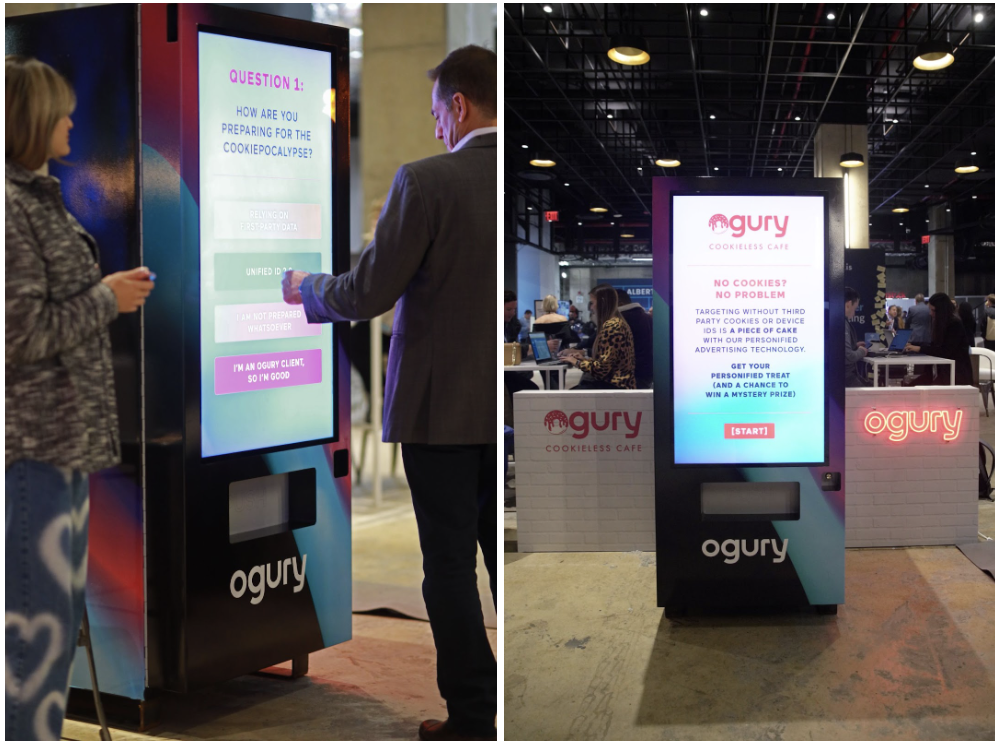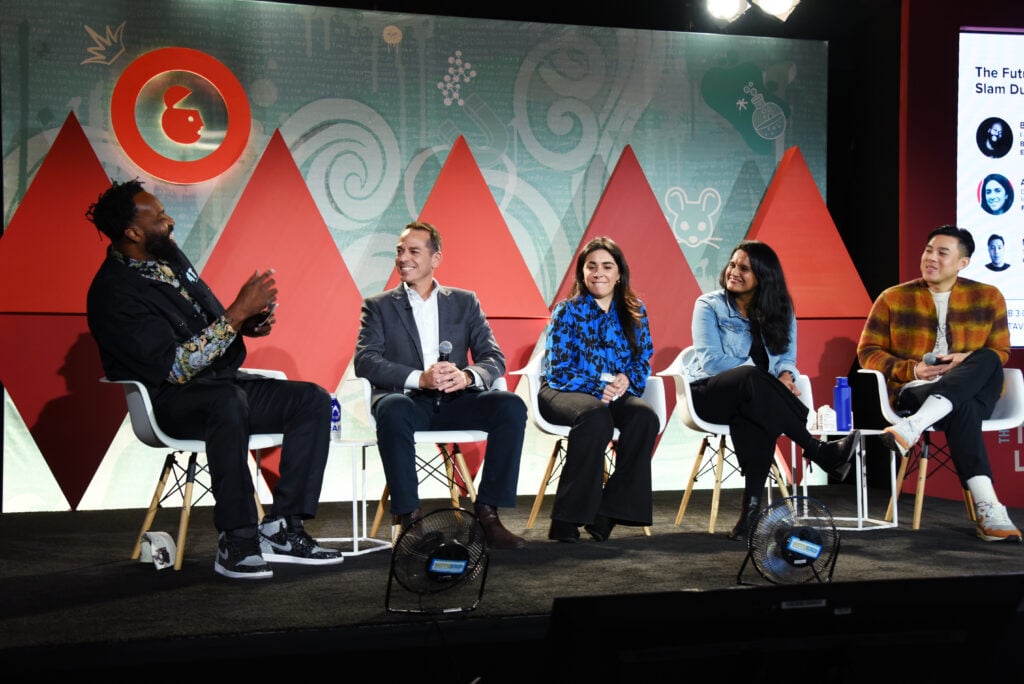Ogury’s Cookieless “Personified Advertising” Solution Takes Center Stage at Advertising Week
Ogury put on a memorable display of our Personified Advertising solution at Advertising Week New York, demonstrating its benefits and how it is the best way to reach consumers now and in the future. We invited attendees to our Cookieless Cafe, where they were treated to “personified” desserts from our futuristic vending machine.

We also led a panel discussion, “The Future is Now and Personified Advertising is a Slam Dunk,” moderated by NBA all-star, investor, and entrepreneur, Baron Davis.
Our panelists included Anthony Flaccavento, Ogury’s General Manager of the Americas, who was joined by three industry leaders:
- Ali Saraniti, Director of Research & Insights at Fandom
- Nidhi Sood, VP of Media at Vayner Media
- Michael Liu, SVP, Head of Innovation at Carat
The panelists shared unique insight into how advertisers can solve some of the industry’s most prevailing problems while remaining relevant in the evolving advertising landscapE.
Delivering personas based on behaviors and interests
With the deprecation of third-party cookies, panelists agreed that respect and personification were of the utmost importance. For Ogury, consent, privacy, and the responsible use of data have always been at the heart of personified advertising. “[Ogury] recognized where the market was moving based on behaviors and regulations. We feel the best way to approach a cookieless and ID-less market is to deliver personas based on interests at the placement level,” Flaccavento said.
Saraniti agrees, foreseeing advertisers becoming more focused on consumer insights, such as behaviors to fuel their strategies. She expressed the importance of being mindful of consumer preferences as they become increasingly aware and protective of their data.
To Liu, there has been a “power dynamic shift back to the consumer,” where getting consent is no longer just an option. “We don’t look at this as the demise of the cookie, but the rise of addressability.” This is precisely where Personified Advertising fits in: rather than relying on cookies, Ogury utilizes its proprietary technology to create consumer segments or “personas,” to serve ads near relevant content that consumers are most likely to engage with.
Let your creative speak directly to the consumer
Creative must be effective and captivating to truly capture the attention of the consumer. To Sood, this can be accomplished by avoiding broad brand messaging and instead distributing highly relevant creative that resonates with personas. We can cut through the noise and create more engagement by “putting it out at the speed of culture, being in the moment and speaking to them when it matters to them the most.”
Beautiful creatives are not enough, according to Flaccavento. The delivery should be meaningful, and the ad should be fully visible, or else it will be ineffective. Therefore, placement is fundamental in the message getting through and making an impact. Ogury exclusively utilizes 100% on-screen formats that demand consumer attention, increase campaign awareness, and provide a dynamic and interactive user experience.
From Liu’s perspective, many see data as “evil” when it should be used as a tool that can inform the creative and ultimately capture information and insights. Especially because creative is 60% of decision-making.
“Data in itself has value, creative in itself has value, the media placement has value, but the power is when you bring all those together in a meaningful way,” Flaccavento shared. “When they are highly coordinated and synchronized, it feels natural – the ad feels like it belongs, the customer feels like there is value, and the performance will be there as a result of that combination. And that’s the endgame.”

Diversity, equity, and inclusion doesn’t stop at the campaign level
Davis explained that in the advertising industry, we want to have representation of community and culture and not be targeted as a mere data point. With that in mind, how can companies leverage new tech and platforms to create a more inclusive environment?
Saraniti suggests that diversity, equity, and inclusion (DEI) in advertising cannot be limited to a simple campaign parameter if the meaning is not also at the core of the brand and strategy. For example, the messaging of a creative must be more than just diversity, but instead a “celebration of the history and culture that we have in this country.” That, paired with the right context and platform will trigger real change over time.
According to Flaccavento, it starts with acknowledging that things need to change. It will be a slow process but can be accelerated through education, hiring practices, and the recognition of cultural differences. “Those types of things will create a groundswell of support that is sustainable over time, ultimately leading to the results that we want; to have a more diverse workforce which will attract more diverse creators, which will create more diverse content which we can then distribute at scale.”
“Ultimately, it’s a ‘rising tides lift all boats mentality,’” he explained. “With Personified Advertising, using personas, in general, is an inclusive approach in the way that we are targeting because it is based on interests and characteristics that are like-minded.”
Top industry players tend to agree with Flaccavento, quickly realizing and taking advantage of the vast benefits this privacy-first approach offers advertisers and consumers alike. It’s safe to say that Personified Advertising is, indeed, a “slam dunk.”
Subscribe to
The Ogury Outlook
Get expert insights, industry news, events and actionable tips.